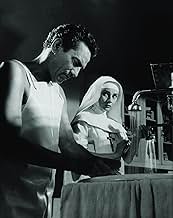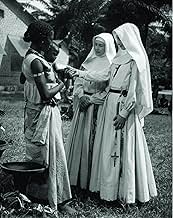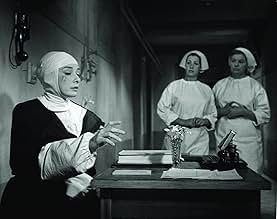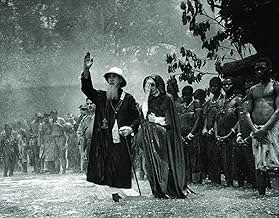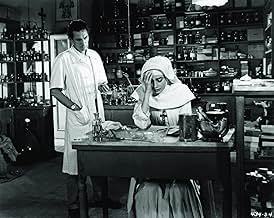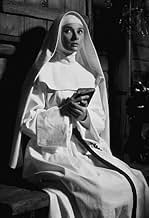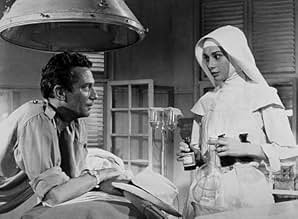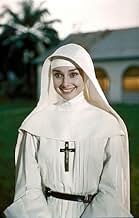Dopo aver lasciato una ricca famiglia belga per diventare suora, suor Luke, lotta con la sua devozione ai suoi voti durante la crisi, la delusione e la seconda guerra mondiale.Dopo aver lasciato una ricca famiglia belga per diventare suora, suor Luke, lotta con la sua devozione ai suoi voti durante la crisi, la delusione e la seconda guerra mondiale.Dopo aver lasciato una ricca famiglia belga per diventare suora, suor Luke, lotta con la sua devozione ai suoi voti durante la crisi, la delusione e la seconda guerra mondiale.
- Regia
- Sceneggiatura
- Star
- Candidato a 8 Oscar
- 11 vittorie e 23 candidature totali
- Rev. Mother Emmanuel (Belgium)
- (as Dame Edith Evans)
- Mother Mathilde (Africa)
- (as Dame Peggy Ashcroft)
Recensioni in evidenza
Audrey Hepburn is Gabrielle van der Mal, a young Belgian woman who commits her life to Christ and becomes Sister Luke. Hepburn was proud of this film and justifiably so. Her portrayal (based on a true story) is riveting and authentic. The entire cast is excellent. Peter Finch plays Dr. Fortunati, a physician who challenges Sister Luke with his outspoken nature and his disregard for convention.
The narrative goes well beyond Sister Luke's struggle with her vows of poverty, chastity and obedience. It is a coming of age story and a celebration of self-actualization. In the end, the viewer is left wanting more. Hepburn extracts the maximum emotional impact from each scene, and we know there is much more to this story beyond the final, haunting shot.
This is an utterly fascinating story of a young nun (Audrey Hepburn), and a non-believing doctor (Peter Finch). Sister Luke (Hepburn) is constantly challenged in sticking to her vows, especially the one of obedience.
She chaffed at the rules that did not leave room for common sense. Is it better to strictly obey or to do more good in disobedience? It is a question asked over and over.
Things become more difficult as WWII starts. Now, the rules must be set aside to help the war effort. Eventually, the conflict between the rules and her need for independence is resolved.
Hepburn was fantastic, as was Finch. Well worth seeing.
In the eyes of her father, Dr Van Der Mal (Dean Jagger), our protagonist - young Gabrielle (Audrey Hepburn) is not really a strong willed girl obedient to the bells. Perhaps he sees other future for her. However, she makes up her mind to resign from engagement with one Jean and sacrifice her life for interior and exterior silence, for the detachment of worldly goods, for obedience and penance doing good and disappearing for the sake of the Kingdom of God. Although she manages to go through the agonies of various inner struggles and tests, will she be able to exercise and bring into action the spirit of charity for all, to face Christianity's hardest obedience - forgive everyone, all evil-doers for anything harmful done to them or their beloved ones?
The truest merit of Fred Zinneman's movie, at first sight, seems to lie in the execution of the storyline (the film's literary source is the book by Kathryn Hulme). It is, as the title implies, a nun's story not so much supplied with laughable aspects (as it is the case with a number of movies nowadays) but a very insightful, thought provoking depiction of virtues enforced and exercised behind the 'bars' of the convent. With this in mind, we deservedly prepare for an excellent glimpse of the atmospheric mystique, for prayers, hymns clothed in unearthly tunes of sublime music. Here, great credit goes not only to the cinematographer Franz Planer, a winner at Academy Awards, who supplies us with cinematographic pearls, including the tremendously effective shots of interior silence of the specific place, but also to Franz Waxman for his brilliantly atmospheric, accurate and vibrant music score. He memorably incorporates certain tunes derived from almost 'iconic' chants to particular scenes. In this way, the score sets the right tone for the story, changes and controls the moods of various scenes. That refers to such pieces of music as 'Salve Regina' and 'Veni Creator Spiritus' - milestones of Christian music.
However, the greatest praise is not deservedly directed towards the crew members, even to the director Fred Zinneman but to Audrey Hepburn in the lead. It seems quite obvious that not every actress can play a nun convincingly. Simply because we, as viewers with certain background experiences (both visual and conceptual), are heavily influenced by certain expectations, even clichéd expectations. In that respect, Ms Hepburn really meets our expectations...more to say, she makes for a perfect portrayal of a nun. There is a combination of certainty and doubt, subtlety and strictness in her face and her entire portrayal, which makes her character easily empathized with. Because the gist that lies behind the fact who Gabrielle/Sister Lukas really is appears to be underlined in her struggles to learn obedience and humility. These virtues that are so memorably and timelessly revealed in Culpa and Penance evoke in her performance. Ms Hepburn portrays a very human character, a very gentle young girl, a subtle nun and a dedicated nurse. Simply a superb performance! A sophisticated portrayal! She is funny at times (mind you the lovely scene with little Felix) and genuinely dramatic when the moment requires that perfectly switching from one bunch of emotions to another. If I were to name her best scenes, I think that task would be quite impossible. I would highlight some of her most memorable scenes, which include the entrance to the convent, the Congo sequence, her collaboration with Dr Fortunati (Peter Finch) vs. the scenes with her father.
The aforementioned Congo sequence belongs to the true pearls among the color films of the late 1950s. Authentic, beautiful shots of nature and landscape, the gloomy scene on the isle of the lepers along with the haunting score long lasts in the memory of a viewer. The film is worth viewing, apart from Ms Hepburn masterful achievement, for the sequence alone.
The supporting cast include some solid performances from Peter Finch as choleric but caring Dr Fortunati, Dean Jagger as wonderful Dr Von Der Mal, Gabrielle's father (what a brilliant father that is who says: "I don't want to be proud of you; I want you to be happy!") and the sisters are uniquely memorable (you will never mix the characters due to their specific features underlined): Peggy Ashcroft as Mother Mathilde, Edith Evans as Mother Emmanuel, Rosalie Crutchley (note Acte from QUO VADIS) as Sister Eleanor. They are recognizable.
Finally, let me quote Bosley Crowther, the New York Times reviewer, who said about the film: "Mr. Zinnemann has made this off-beat drama describe a parabola of spiritual afflatus and deflation that ends in a strange sort of defeat. For the evident point of this experience is that a woman gains but also loses her soul, spends and exhausts her devotion to an ideal she finds she cannot hold."
But what is superior in one's life? Blind obedience to an ideal or being true to oneself? Where are we in that dilemma? Where is our protagonist? What does the final drama indicate? Greater torments or relief? She turns right as she leaves so perhaps...
Dare accuse yourself of seeing it critically but let yourself see it and think. Although the movie is more than half a century old, it has not lost its charm and entertainment along with all the dilemmas herein incorporated. Worth viewing as not only a nun's story but a person's drama.
Gabrielle van der Mal enters a convent in Belgium with the lukewarm approval of her surgeon dad. She is a trained nurse and has a heart for nursing, specifically in the Congo, which was a colony of Belgium's at the time. The film follows her through her first year and a half in the convent until she takes her final vows, the trials and tribulations she faces there, and her delay in finally being assigned to the Congo as a nurse.
This is a great film that doubles as a good documentary on what is involved in becoming a nun, so much so that I'd say that Gabrielle really didn't so much want to be a nun as she figured this was the only path to getting to serve in the Congo as a nurse - a primitive place with a great need for medical professionals of all kinds.
When Gabrielle finally does get to the Congo and has served as OR nurse to the agnostic Dr. Fortunati, she is panicked when the day comes that she is ordered to return to Belgium. Gabrielle isn't so much someone who sees herself as a rebel within the church - this is the tradition that she grew up in and she seems fine with it - as much as she sees everyday life in the convent as boring and tiresome, especially after several years of being a nurse in the Congo and being so very helpful.
Neither does she have a huge problem with forgiveness. In Africa a native beats another nun to death for no other reason than a witch doctor told the man that if he killed a white woman that the ghost of his dead wife would stop haunting him. In spite of the pointlessness of the murder, in spite of the fact that she knew the murdered nun, Gabrielle has sympathy and forgiveness in her heart for the killer. But then she returns to Europe and the Nazis invade and quickly take over Belgium. When they kill her father while he is tending to some refugees, Gabrielle realizes her heart is not big enough to forgive such systemic cruelty. At that point she must make a choice.
This film is based upon a novel written by Kathryn Hulme, the partner of Gabrielle van der Mal for over thirty years, until Hulme's death in 1981. Perhaps it was because the author was so close to Gabrielle that the main character is so well examined.
Lo sapevi?
- QuizThe role of Sister Luke was suggested for Ingrid Bergman but Bergman herself said she was too old for the role and instead proposed Audrey Hepburn.
- BlooperWhen the patient in the Congo hospital is being attended by several people, the voice of the actor playing the patient is obviously dubbed over by actor Dean Jagger, who plays Sister Luke's father in the film.
- Citazioni
Sister Luke: You can cheat your sisters, but you cannot cheat yourself or God.
Rev. Mother Emmanuel: Have you struggled long enough to say surely that you've come to the end?
Sister Luke: I think I've been struggling all these years, Reverend Mother. In the beginning each struggle seemed different from the one before it. But then they began to repeat, and I saw they all had the same core: obedience. Without question, without inner murmuring. Perfect obedience as Christ practiced it. As I no longer can.
Rev. Mother Emmanuel: Yes?
Sister Luke: There are times when my conscience asks which has priority. It or the Holy Rule? When the bell calls me to chapel, I often have to sacrifice what might be the decisive moment in a spiritual talk with a patient. I'm late every day for chapel or refectory or both. When I have night duty I break the Grand Silence because I can no longer cut short a talk with a patient who seems to need me. Mother, why must God's helpers be struck dumb by five bells in the very hours when men in trouble want to talk about their souls?
- ConnessioniFeatured in Hey Dad..!: Testing Time (1990)
- Colonne sonoreVoi Che Sapete
from "The Marriage of Figaro"
Written by Wolfgang Amadeus Mozart (as W. A. Mozart)
Played by Gabi and her father on the piano, and recurring throughout the film's score.
I più visti
- How long is The Nun's Story?Powered by Alexa
- Is "The Nun's Story" based on a book?
- Why did Gabrielle want to become a nun?
- Why was Gabrielle's name changed to "Sister Luke"?
Dettagli
- Data di uscita
- Paese di origine
- Lingua
- Celebre anche come
- The Nun's Story
- Luoghi delle riprese
- Brugge, West-Vlaanderen, Belgio(Convent exteriors, other exteriors)
- Azienda produttrice
- Vedi altri crediti dell’azienda su IMDbPro
Botteghino
- Budget
- 3.500.000 USD (previsto)
- Tempo di esecuzione2 ore 29 minuti
- Colore
- Proporzioni
- 1.85 : 1
Contribuisci a questa pagina



